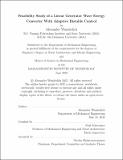Feasibility Study of a Linear Generator Wave Energy Converter With Adaptive Bistable Control
Author(s)
Wunderlich, Alexander
DownloadThesis PDF (5.274Mb)
Advisor
Sclavounos, Paul
Terms of use
Metadata
Show full item recordAbstract
Oceanic wave energy harvesting is a promising source of renewable energy that involves the conversion of oscillatory motion into electrical energy. However, the majority of traditional wave energy converters rely on intermediary mechanisms that increase complexity and can incur energy losses. Linear generators have emerged as a promising wave energy technology that bypass the limitations of intermediaries through direct mechanical to electrical energy conversion. The convention is to configure the generator so that incident waves excite the resonant frequency of the device. The irregular and broadband nature of ocean waves poses a challenge to this technique, as the device must be configured to respond to a wide range of incident frequencies. This thesis proposes a novel design for a linear permanent magnet generator that considers a tension leg platform oscillating in oceanic surge motion as its basis. The performance of the proposed device is analyzed using numerical simulations, and the potential for optimization techniques and the implementation of adaptive bistable control logic to improve broadband energy harvesting is investigated. The results demonstrate that these proposed alterations can increase the harvesting potential and efficiency of a wave energy converter, with the potential to contribute to the growing demand for renewable energy sources.
Date issued
2023-06Department
Massachusetts Institute of Technology. Department of Mechanical EngineeringPublisher
Massachusetts Institute of Technology